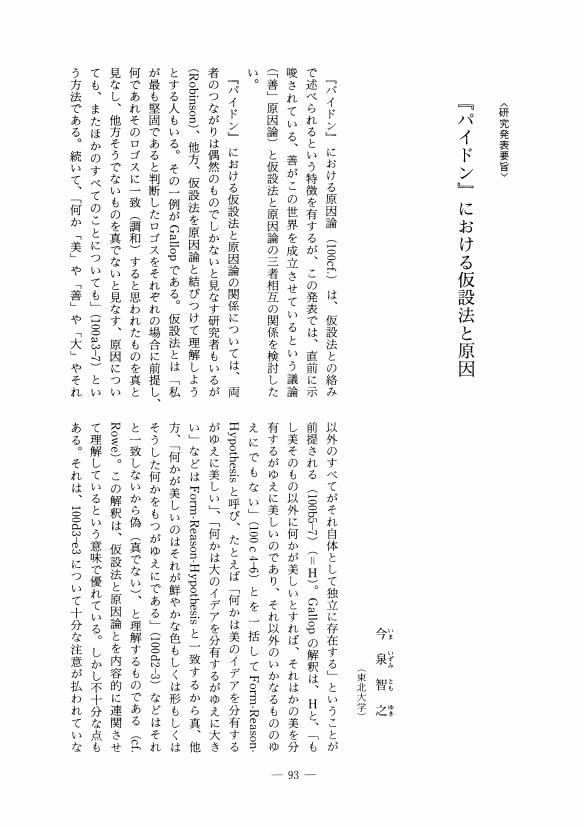4 0 0 0 OA エコノミー概念の倫理思想史的研究
本研究は、「エコノミー」という事柄を、その概念史をふまえながら、倫理をめぐる原理的問題として考察し、諸々の研究領域を横断する新たな倫理学的視座を模索することを課題として、研究会等での多様な議論を通じて実施された。その結果、従来十分に明らかにされてこなかった「エコノミー」の概念史に関する包括的な視座を獲得し、その概念的実質について一定の知見を得た。また、そのような知見に依拠しながら、「エコノミー」と倫理をめぐる原理的な諸問題の所在を、いくつかの現代的事象や現代思想等に関わる個々の論点にそくして明らかにした。
2 0 0 0 IR 〈開かれること〉としての自律 ―アドルノにおける「自律」概念の再構成(下)―
- 著者
- 麻生 博之
- 出版者
- 東京経済大学人文自然科学研究会
- 雑誌
- 人文自然科学論集 = The Journal of Humanities and Natural Sciences (ISSN:04958012)
- 巻号頁・発行日
- pp.106-79, 2019-12-04
2 0 0 0 IR 〈開かれること〉としての自律 : アドルノにおける「自律」概念の再構成(上)
- 著者
- 麻生 博之
- 出版者
- 東京経済大学人文自然科学研究会
- 雑誌
- 人文自然科学論集 = The Journal of Humanities and Natural Sciences (ISSN:04958012)
- 巻号頁・発行日
- no.144, pp.278-256, 2019-02-20
2 0 0 0 批判と歴史:――アドルノとベンヤミンのマルクス理解にそくして――
- 著者
- 麻生 博之
- 出版者
- 日本哲学会
- 雑誌
- 哲学 (ISSN:03873358)
- 巻号頁・発行日
- vol.2010, no.61, pp.85-104_L7, 2010
If one were to reread Marx's writings today, which would be the phase of Marx's thought that would merit special attention? In this paper, I find that one core of Marx's thoughts lies in “critique.” I would therefore like to explore the significance that this critique can have as a form of fundamental thought. With this in mind, I want to consider Adorno's and Benjamin's interpretation of Marx's thought, with particular reference to their emphasis on “history”. <br>Adorno characterizes Marx's thought as “a critical theory of society” and thinks that it is only understandable as “a historical theory”. Adorno's view is remarkable in that it characterizes Marx's thought as a form of “interpretation (Deutung)” of “natural history (Naturgeschichte)”. This can be seen as an attempt, on the one hand, to show that various societal realities that should have historical reality appear as something inevitable or as things which obey “the coercion of nature”, but on the other hand, to perceive such realities in the form of something natural or eternal which have become historically, therefore as things which are fundamentally contingent. Benjamin, in contrast, thinks that one core of Marx's thoughts consists in the recognition of history as a “critique” to uncover “the memory of the anonymous (das Gedächtnis der Namenlosen)”. In Benjamin's view, when history up to the present is grasped as something continuous, it is just a “continuum of the oppressors”. Benjamin defines the form of history description that liquidates “the epic element” of this continuous history as “construction”, and tries to understand an essential part of the Marx's thought as such an attempt to explode “the continuum of history” and to rescue “the tradition of the oppressed”.<br>In this paper, through my clarification of Adorno's and Benjamin's understanding of Marx's thought, I attempt to examine the significance of Marx's “critique” of “history” and, through it, offer a worthy topic for further discussion.
1 0 0 0 OA 批判と歴史 ――アドルノとベンヤミンのマルクス理解にそくして――
- 著者
- 麻生 博之
- 出版者
- 日本哲学会
- 雑誌
- 哲学 (ISSN:03873358)
- 巻号頁・発行日
- vol.2010, no.61, pp.85-104_L7, 2010 (Released:2011-01-18)
- 参考文献数
- 26
If one were to reread Marx's writings today, which would be the phase of Marx's thought that would merit special attention? In this paper, I find that one core of Marx's thoughts lies in “critique.” I would therefore like to explore the significance that this critique can have as a form of fundamental thought. With this in mind, I want to consider Adorno's and Benjamin's interpretation of Marx's thought, with particular reference to their emphasis on “history”. Adorno characterizes Marx's thought as “a critical theory of society” and thinks that it is only understandable as “a historical theory”. Adorno's view is remarkable in that it characterizes Marx's thought as a form of “interpretation (Deutung)” of “natural history (Naturgeschichte)”. This can be seen as an attempt, on the one hand, to show that various societal realities that should have historical reality appear as something inevitable or as things which obey “the coercion of nature”, but on the other hand, to perceive such realities in the form of something natural or eternal which have become historically, therefore as things which are fundamentally contingent. Benjamin, in contrast, thinks that one core of Marx's thoughts consists in the recognition of history as a “critique” to uncover “the memory of the anonymous (das Gedächtnis der Namenlosen)”. In Benjamin's view, when history up to the present is grasped as something continuous, it is just a “continuum of the oppressors”. Benjamin defines the form of history description that liquidates “the epic element” of this continuous history as “construction”, and tries to understand an essential part of the Marx's thought as such an attempt to explode “the continuum of history” and to rescue “the tradition of the oppressed”.In this paper, through my clarification of Adorno's and Benjamin's understanding of Marx's thought, I attempt to examine the significance of Marx's “critique” of “history” and, through it, offer a worthy topic for further discussion.
1 0 0 0 OA アドルノ「否定弁証法」における主観の機能 思惟の自己反省と経験のポテンシャルについて
- 著者
- 麻生 博之
- 出版者
- 日本哲学会
- 雑誌
- 哲学 (ISSN:03873358)
- 巻号頁・発行日
- vol.1997, no.48, pp.297-306, 1997-05-01 (Released:2009-07-23)
後期アドルノは哲学のとるべき態度を「否定弁証法」と規定した。弁証法の否定性が要求される決定的な理由は、「客観の優位」 (Vorrang des Objekts) という反観念論的な主張に求められる。アドルノは、主観性を原理とする哲学を欺瞞として批判しつつ、観念論を乗り越える哲学のあり方を、否定弁証法の名のもとに設定するのである。だがそれゆえに、ともすればアドルノの哲学は、主観性に依拠した理論的次元そのものと訣別するかの印象を与えることにもなる。たしかにアドルノ自身の語るとおり、否定弁証法に貫かれているのは、整合的な概念の「崩壊の論理」にほかならない (GS6. 148) 。しかしアドルノが行なう観念論への仮借なき批判は、概念に基づく思惟のレベルそれ自身を放棄するものではない。否定弁証法を単に観念論へのアンチテーゼとみなすことは、むしろアドルノの意図を捉えそこなうことになる。アドルノが試みたのは、主観性の原理を克服する方途を、あくまで主観それ自身のあり方のうちに見いだすことであった。この逆説的な試みのうちに否定弁証法の実質を見きわめること、ここに本稿の目的がある。つまり、客観の優位を主張するアドルノ哲学の実質がむしろ主観の潜在的可能性に置かれていることを明らかにし、この主観の機能を見定める点である。課題の中心となるのは、アドルノが着目する主観のあり方を、カントとヘーゲルとの関連において際立たせること、そして主観に見込まれる積極的機能を、「経験」 (Erfahrung) と思惟の「自己反省」 (Selbstreflexion) という概念に即し確定することである。テキストとしては、後期の理論的主著『否定弁証法』を中心に、同書と前後して執筆された幾つかの論文を取り上げる。
1 0 0 0 OA アドルノにおける「自己反省」概念の射程 : ハーバーマスの批判をめぐって
- 著者
- 麻生 博之
- 出版者
- 東北哲学会
- 雑誌
- 東北哲学会年報 (ISSN:09139354)
- 巻号頁・発行日
- vol.15, pp.14-27, 1999-05-20 (Released:2018-02-28)
- 著者
- 熊野 純彦 木村 純二 横山 聡子 古田 徹也 池松 辰男 岡田 安芸子 吉田 真樹 荒谷 大輔 中野 裕考 佐々木 雄大 麻生 博之 岡田 大助 山蔦 真之 朴 倍暎 三重野 清顕 宮村 悠介 頼住 光子 板東 洋介
- 出版者
- 東京大学
- 雑誌
- 基盤研究(B)
- 巻号頁・発行日
- 2017-04-01
2018年度は、本研究の主要達成課題のうち、「各層(家族・経済・超越)の各思想の内在的理解」を中心とする研究がなされた。近現代日本の共同体論を再検証するにあたっては、2017年度で取り組まれた「和辻共同体論の参照軸化」に加え、家族・経済・超越それぞれの層に関連する思想を巡る形成の背景に対しても、テクストに内在した読解を通じて光を当て直す必要がある。以下、そうした問題意識のもとに取り組まれた、2018年度の関連実績のうち主要なものを列挙する。(1)研究代表者の熊野純彦は、著書『本居宣長』において、近世から現代に至るまでの代表的な思想家たちによる宣長の思想の受容過程を丹念に整理・検証することで、それを近代日本の精神史の一齣として提示することを試みた。それを踏まえたうえで改めて宣長のテクストの読解を行い、今日の時代のなかでその思想の全体像を捉えかえそうとしたところに、本業績の特徴がある。(2)研究分担者宮村悠介は、主に本研究の研究分担者からなる研究会(2018年9月)にて、研究報告「家族は人格ではない 和辻共同体論のコンテクスト」を行い、和辻倫理学の形成過程におけるシェーラーの影響と対話の形跡を、具体的にテクストをあげつつ剔抉した。これは、翌年度の課題である「思想交錯実態の解明」にとってもモデルケースとなる試みである。(3)超越部会では台湾の徐興慶氏(中国文化大学教授)を招聘、大陸朱子学と、幕末から近代に至るまで様々な思想に陰に陽に影響を及ぼしてきた水戸学の影響関係について知見をあおいだ(「「中期水戸学」を如何に読み解くべきか 徳川ミュージアム所蔵の関係資料を視野に」2018年)。これにより、広く東アジアの思想伝統と近世以降現代に至るまでの日本思想の受容・対話の形跡を実証的に検証することの重要性を改めて共有できたことは、本研究の趣旨に照らしても重要な意義を持つと思われる。

